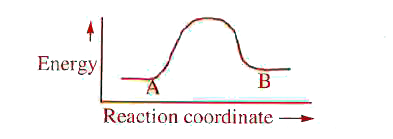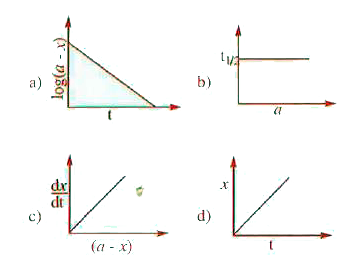If a is the initial concentration of the reactant, the time taken for completion of the reaction if it is of zero order will be Solution in Telugu
a/k
a/2k
2a/k
k/a
The correct Answer is:A
Step by step video, text & image solution for If a is the initial concentration of the reactant, the time taken for completion of the reaction if it is of zero order will be by Chemistry experts to help you in doubts & scoring excellent marks in Class 12 exams.
Topper's Solved these Questions
- BOOK - AAKASH SERIESCHAPTER - CHEMICAL KINETICSEXERCISE - OBJECTIVE EXERCISE - 2 (Reaction rates and influencing factors)15videos
CHEMICAL KINETICS
- BOOK - AAKASH SERIESCHAPTER - CHEMICAL KINETICSEXERCISE - OBJECTIVE EXERCISE - 2 (Collision theory)2videos
CHEMICAL KINETICS
- BOOK - AAKASH SERIESCHAPTER - CHEMICAL KINETICSEXERCISE - OBJECTIVE EXERCISE - 1 (Collision theory)14videos
CHEMICAL KINETICS
- BOOK - AAKASH SERIESCHAPTER - CHEMICAL KINETCSEXERCISE - EXERCISE - 3.245videos
CHEMICAL KINETCS
- BOOK - AAKASH SERIESCHAPTER - CHEMICAL THERMODYNAMICSEXERCISE - Additional Practice Exercise54videos
CHEMICAL THERMODYNAMICS
Similar Questions
Consider the following reaction N2(g)+3H2(g)→2NH3(g). The rate of the reaction in terms in terms of N2 at T(k) is −d[N2]dt=0.02 mole lit−1sec−1. What is the value of −d[H2]dt (in mole lit−1sec−1) at the same temperature?
03:30View SolutionThe minimum energy required for molecules to enter into chemical reactionn is called
02:43View SolutionFor a reversible reaction, A⇔B, which one of the following statements is wrong from given energy profile diagram ?
 03:35View Solution
03:35View SolutionDiscuss on the kinetic spontaneity of a chemical reaction. Is a slow reaction spontaneous? Why?
View SolutionWhich among the following is not an exact differential?
05:25View SolutionThe initial concentration of both the reactants of a second order reaction are equal and 60% of the reaction gets completed in 30s . How much time will be taken in 20% completion of the reaction?
03:12View SolutionReactant 'A' (initial concentration, a) reacts according to zero order kinetics, the time takews for the completion of the reaction is
03:35View SolutionIf initial concentration is reduced to its 1/4 th in a zero order reaction , the time taken for half of the reaction to complete
02:01View SolutionIf 'a' is the initial concentration of the reactant, the time taken for completion of the reaction, if it is of zero order, will be
02:01View SolutionWhich of the following graphs represent a first order reaction (a=initial concentration of reactant, x=concentration of reactant consumed, t=time)
 View Solution
View SolutionIf initial concentration is reduced to 1/4th in a zero order reaction , the time taken for half the reaction to complete
View SolutionIf initial concentration is reduced to its 1/4th in a zero order reaction, the time taken for half of the reaction to complete
06:17View SolutionIf a is the initial concentration of the reactant, the time taken for completion of the reaction if it is of zero order will be
01:37View SolutionIf a is the initial concentration of the reactant, the time taken for completion of the reaction if it is of zero order will be
02:46View SolutionHow many time is required to complete reaction when initial concentration of reactant is [R]0 zero order reaction?
03:11View SolutionIf initial concentration is reduced to its 1/4th in a zero order reaction ,the time taken for half of the reaction to complete……
02:17View Solution

